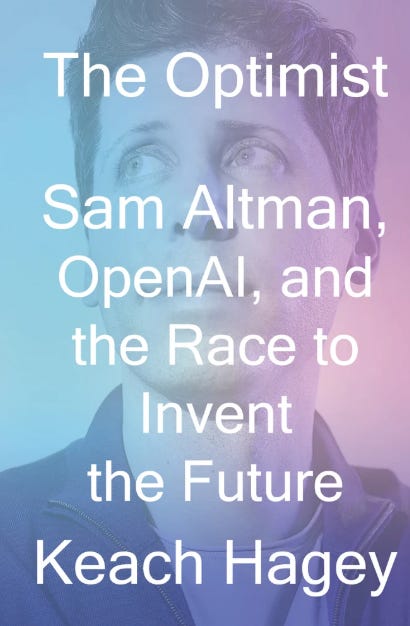Hiya Smarty: It's Your Weekly Reads!The Austin Bureau on Musky Masculinity. Plus: Molly Jong-Fast, Jess Walter, Maggie Stiefvater, Lucas Schaefer, and more…Letter from Dripping SpringsDear Wags, Elon Musk left Washington with a black eye. Sometimes, the universe spoonfeeds you metaphors. At his Oval Office exit interview, he coordinated his shiner with a black DOGE-branded cap, and a t-shirt that read The Doge Father. Because this is serious business. Asked what happened to his face, Musk said: “I told little X to punch me in the face. And he did.” At last—a Musk who understands what the public wants. Don’t worry, we’re not going to wade into another dreary political broadside from here. Why bother with petty politics when the rest of the show is so distractingly appalling? Like generations of executives who’ve gotten the hook, Musk insists his D.C. ouster was all his idea—and his boss, like so many bosses before him, went along with the spin, cashiering a decompensating boy wonder with a handshake and a tacky gold key. “He’s not really leaving,” said President Trump from behind the Resolute Desk, in an executive office done over as a supervillain’s bordello. “He’s going to be back and forth... I think he’s going to be doing a lot of things.” Translation: don’t let the gold-plated trapdoor hit you on the way down. Perhaps Musk will use his semester at sea to salvage his companies and reputation. The White House goodbye party coincided with a story from the diabolical New York Times, detailing Musk’s ketamine use—reportedly so excessive it loosened his bladder—along with more mean girl gossip about mushrooms, ecstasy, and Adderall. Then there’s the legal and personal shrapnel you get from knocking up legions of sentient fem-bots, or whatever they’re called. Musk has at least 14 kids by different mothers—ladies he sometimes propositions on the social media app he’s glued to, offering to impregnate them for money. What’s so gross about that? Family values are for analog dorks like Mike Pence. “The New York Times. Is that the same publication that got a Pulitzer Prize for false reporting on the Russiagate?” Musk said in his malfunctioning android voice. “Let’s move on.” Must we? Later, he posted on X—not the kid whose fist he claims he walked into, but the platform he commandeered to say neato dark triad stuff—that he’s not on drugs. Planned Parenthood, AOC, and the rest of the Matrix just want to tear down John Galt-style rugged individualists. We don’t need the snobs at the Times (who do get things wrong) to confirm what’s before our non–Neuralink-augmented eyes. Musk is a 53-year-old who spends hours playing video games and brags about how awesome he is at them. An apologist for South African ickiness who believes that the “fundamental weakness of Western civilization is empathy.” An automaton who named a child X and calls that poor imp his “emotional support human.” In other words, a regular Cary Grant. Musk’s signature achievement in unappointed, unelected public service was a Texas Chainsaw Massacre of government, costing tens of thousands of U.S. taxpayers their jobs. Then there’s the shredding of USAID, which, according to modeling from Boston University, has already cost an estimated 300,000 lives. The administration and Musk say that’s all lies and propaganda. Well, you know the Matrix! Yes, Musk created a successful electric car company (hard), which he drove off a cliff (shockingly easy). He’s hurled quite a few projectiles into space—quite a few even stay there. He has Big, Podcast-Worthy Ideas, which people indulge because he’s mind-bogglingly rich. Once or twice, he’s been compared to Einstein, which seems like grounds for a cease-and-desist letter from the Einstein estate. Look, a lot of brilliant people turn out to be lousy. But Musk’s twenty-teens radiance, such as it was, was long eclipsed by Thanos-grade crumminess. How he was able to inflict himself on the federal bureaucracy will be studied for generations—hopefully to prevent it from happening again. Government really ought to be lean, efficient, and honest. It transpires that making it so requires competence. DOGE didn’t deliver anything close to the $1 trillion in savings it promised. All that showy meat-cleaving will soon be obliterated by Trump’s own budget. Newly cut off from government work, Musk called that budget a “disgusting abomination.” So what was the point? Brazen vandalism—enabled by a neutered Congress. An abrogation of checks and balances that Americans, especially those who claim the mantle of conservatism, should abhor. High on his own digital supply, the tech mogul and his pimply acolytes hacked away at systems they had no wish to understand. Their victims were beneath comprehension—let alone a weakling’s empathy. We know they got off on inflicting pain because they kept crowing about it, in orgiastic glee. That Musk rose to become a major influence on public policy—when even becoming a White House intern used to require a drug test—is a sound argument for abolishing oligarchy and celebrity. MAGA Gandalf Steve Bannon (never a fan) says Musk is out because Trump finally grasped his liabilities go beyond hinky foreignness. He reportedly shoved Treasury Secretary Scott Bessent, whom he sick-burned as “a Soros agent,” and was slated for top-secret briefings on China. There, his business entanglements raised conflicts of interest serious enough to rattle even an administration not exactly distinguished by probity. Meanwhile, billionaire Jared Isaacman, a longtime Musk associate, once tapped to head NASA, was unceremoniously beamed to Alpha Centauri. Why the change of heart? Musk’s billions in government entanglements—Tesla, SpaceX, Starlink—weren’t a problem before. Chalk it up to that Trumpian obsession with aesthetics. Musk, mighty smasher of galaxies, is bad at terrestrial TV. He comes across as poignantly unlikable. He once declared, “I love Donald Trump as much as a straight man can love another man.” How mortifying it was to watch him crave the Great Crocodile’s affection—to tag along on Air Force One, have ice cream and sleepovers at the White House—as if the world’s richest person had nothing better to do. (Tesla’s beleaguered board has some ideas.) That sweaty neediness—a perennial outcast’s negative charisma—was bound to curdle receptors in 47’s lizard brain. Still, Trump sounded genuinely sympathetic during the exit interview. He even said he barely noticed the black eye. Absolutely. Donald J. Trump would never, ever notice something wonky about another person’s appearance. Like everybody else, the president knows something is off. Enormous wealth transformed Musk from a computer-bound shut-in into an uncanny-valley superhero: the hair plugs, the eerily sculpted face—laminated, in the words of Bill Burr—the Play-Doh musculature. Is it surprising that Musk is a binge eater, suffers “great highs, terrible lows, and unrelenting stress”? That he’s ditched conventional treatment for whatever’s trending in the manosphere? That his eugenics-informed harem fetish is, how shall we say, Mansonian? For all his billions, Musk is a lost little boy who never got over having a crappy father. His swan dive into a MAGA rabbithole to combat the woke mind virus may destroy everything he built. He created a product beloved by Hollywood liberals, then trashed it with red pill politics. The mishmash of space travel, futurism, and neonatalism now runs like the daydreams of a comic book store lifer—just like the Tesla truck is a grade school binder doodle brought to life. All it’s missing is a tinker-toy laser gun mounted on the hood. Musk self-soothes by indulging in the galling depravity of a masculinity deformed by money and divorced from honor and restraint. He’s got plenty of company. The week the black-and-blue tycoon limped away from the White House, the sex trafficking and racketeering trial of Sean Combs—let’s dispense with the nightclub handles; the guy is a 57-year-old grandfather—ground away in New York Federal Court. After days of testimony, Combs’s history of threats and violence was slathered on the public like the baby oil he favored in crudely unimaginative sex tableaux. The latest allegations came from a former assistant who testified that she’d been brutalized over years of employment. Combs’s lawyers pointed to her being paid handsomely and declaring love for him—which doesn’t quite airbrush away the allegations of his ex-girlfriend Cassie Ventura and several busloads of aspiring plaintiffs with grotesquely detailed horror stories. Who knew hell came with bottle service. Still, the more lurid the headline, the more likely a fellow reality star with access to the nuclear codes will weigh in to get a piece of the action. “He used to really like me a lot,” Trump said of the hip-hop de Sade, “but I think when I ran for politics... that relationship busted up... I would certainly look at the facts.” They may vote differently, but Musk and Combs orbit the same brutish ideal of manhood: a chest-thumping, Scarface-inflected, terminal allergy to accountability. You hardly need a rap sheet to be a nightmare to get along with. Speaking of, Andrew Tate—the global avatar of Axe Body Spray-soaked hucksterism—was hit with new assault and trafficking charges in the UK. He and his brother Tristan already face similar charges in Romania. Tate’s response: “The matrix is angry... They do this to ANY man who fights against them... Strength and honor.” Arthurian virtue may not be the first thing one associates with the Brothers Tate, who brought their Lambo-and-Havana preening stateside thanks to the Trump administration (Barron’s reportedly a fan). That’s mortified even MAGA loyalists. Taking a page from Stephen Miller, the elder Tate scolded the UK for letting in too many sex criminals from undesirable countries. That’s rich coming from an American-born kickboxer repeatedly accused of being one himself. These clowns didn’t succeed despite their depravity—it’s the brand. A flawed but meaningful code once linked manhood to restraint, duty, and protecting the vulnerable. A few much-disrespected institutions trained men in sacrifice, honor, and country. Those who followed the rules they instilled were often dismissed as Boy Scouts, mocked, like John McCain, for adhering to an anachronistic code. We could do with more of them now. The idea of Musk, Combs, or the Tates in uniform—let alone serving anyone but themselves—is science fiction even the most addled tech nerd wouldn’t buy. It’s been generations since that vision of service was broadly shared. Now that burden falls on the “suckers and losers,” in the words of our sitting president. Until the 1990s, presidential candidates were practically required to be veterans. How far we’ve drifted from a limiting but still laudable ideal. Lagging educationally and economically, denied vocational training and clear pathways into the middle class, and often desperately lonely, too many young men now gravitate to the shallowest, most domineering templates of masculinity. Defining gang deviancy down—bling, beefs, conquests, revenge—won’t cure what ails them. Do any of our trashworld megalomaniacs seem remotely happy? Does anybody sober believe The Ballad of Elon Musk ends on a note of triumph, let alone on the toxic surface of Mars? The rise of the cartoon alpha and his self-deluding playbook—dominate, deflect, never apologize—sold boys a version of manhood that trashes society and turns power into a repulsive kink. Still, the roster of broken men buying into Randian hokum and MTV Cribs–style fronting—from Hunter Biden to Kanye West—only grows. Figures who play that game are failsons all—paper tigers who crumble the minute things get hard. Little wonder Volodymyr Zelensky, one of the more courageous men of the era, is vilified by so many pretenders. Authentic valor threatens cardboard macho men. But in our fried attention economy, depravity lubes up the algorithm far better than decency—and gives all men a black eye. Yours Ever, Ranse Stoddard The Optimist by Keach Hagey Sam Altman calls this the “intelligence age.” Given the dark potential of the technology he helped unleash, you may be pardoned for not feeling optimistic. Veteran Wall Street Journal reporter Hagey’s biography offers a textured portrait of a brilliant, complicated figure—part idealist, part ruthless Silicon Valley operator. Altman shares traits with other tech titans—Thiel (friend) and Musk (bitter rival)—but his techno-utopianism takes on a quasi-religious cast. OpenAI began as a nonprofit with altruistic goals but quickly pivoted to profit, a shift some saw as pragmatic, others as a great betrayal. He’s worked to mitigate AI’s risks, yet remains a flawed visionary burdened with plenty of personal baggage. It’s telling how many tech leaders hedge boosterism about innovation with private doomsday plans. Even without true consciousness, Altman’s AI tools already mesmerize and deceive humans. He’s often compared to Oppenheimer, but unlike the Manhattan Project, OpenAI is a privatized initiative operating without government oversight. Outsourcing the future to a handful of powerful men—idealistic or not—may prove the biggest gamble of all. — Darlene Alderson So Far Gone by Jess Walter The Great American Dream is to turn your back on everybody else. Walter’s latest novel stars Rhy Kinnick, a recovering newspaper reporter whose dim view of the planet leads him to chuck his cell phone and hole up in a cabin in the woods. Things shift when Kinnick’s two grandkids show up at the shack, abandoned by their wayward mother. The family reunion is interrupted when the kids are snatched by militia types linked to his lousy son-in-law. Off he goes to recover the children, track down his daughter, and generally make things right, with help from a collection of Pacific Northwest oddballs. The backwoods misadventures with druggies and don't-tread-on-me types are hilarious, harrowing, and even endearing. The message: there are still plenty of reasons not to abandon the people you love. — Del Gue Continue reading this post for free in the Substack app |
Hiya Smarty: It's Your Weekly Reads!
15:04
0









